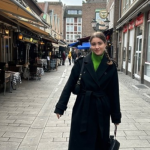Students abroad: Aysha in Austria and Germany

Can you tell us something about yourself? What do you study? Where did you spend your exchange stay?
I am a third-year Ph.D. student and a Menstruation research scholar at the Institute of Sociological Studies, and I spend my exchange as an Erasmus+ intern at the Institute of Sociology, University of Vienna, Austria, and as a Ph.D. visiting scholar under the work Area Organization, Technology and Gender of the Faculty of Human Sciences, University of Cologne, Germany.
What made you decide on your host university? The reputation of the university, the professors, and the project?
As a Ph.D. student and an early career researcher, I prioritized collaborating with experts from my research area, so my primary focus was the professors and the projects they were currently involved in, along with the prestige of the university and the working environment that was offered during my stay.

You are a Ph.D. student, so what exactly did you do there?
I had regular consultations for my thesis and updated my progress with my host supervisors. Apart from that I had to introduce a part of my thesis at the department’s internal workshop and a final lecture for bachelor’s students. I attended seminars and lectures at the University and other research institutes in Vienna and spoke at two master’s seminars as an invited speaker at the University of Vienna and the Central European University during my Erasmus+ stay. In Cologne, I presented the methodology chapter of my thesis at the Ph.D. scientific colloquia and had regular interactions with other Ph.D. students during my stay.
In this exchange you had to secure yourself, there was no help from the International Office at all. How difficult and time-consuming was it?
An internship or stay abroad was mandatory for my PhD program and the Erasmus+ stay was offered after a meeting with my host supervisor and with the incredible support of my home supervisor. The International Office was truly supportive during my application, and it was a smooth process. The inter-university exchange opportunity was notified as an open call on our faculty website, and I had to choose from the three universities involved in the exchange program. After thorough research of these universities and their areas of focus and ongoing projects, I chose the University and the Professor I wanted to work with. I approached the professor via email explaining my intent and after securing the agreement and an official invitation from the professor I proceeded with my application at the International Office. The overall process for the inter-university program has taken approximately three months, i.e., from the date of application at the home university and the confirmation of stay from the host university.

How do you compare the two research experiences?
The Erasmus+ traineeship opportunity at the University of Vienna has been an incredible academic and personal experience. The university had a vibrant student community and academic environment. As a research intern, the integration into the office, working group, university, and the city was smooth and welcoming. As a Ph.D. visiting scholar, I had a similar experience at the University of Cologne too: even though the stay was short, I was given a well-equipped office to work in and a pleasant working atmosphere. Both experiences were academically enriching, and luckily, I met amazing people during my stay. The stays enabled me to experience various academic environments and it was effective in breaking away from my routine as a PhD student in a good way.
Outside of the academic world. Tell us something regarding your first days. Any acclimatization problem – culture shock?
The Erasmus+ traineeship was a semester-long program that required me to register my residential address in Austria within days of arrival. It is called ‘Meldezettal’, and one can make an online appointment at the Municipal office of the district of your residence. As an Erasmus intern, I wasn’t a registered student at the University nor an employee, which was a tricky position to be in. Due to my non-student, non-employee status, I couldn’t get a university student ID card for accessing the library which was difficult in the earlier days as I mostly prefer to work from libraries. I had a similar issue at the University of Cologne where due to my non-registered student status I could not access the library in the first three weeks of my stay, get discounted transport/semester card and the discounts at the university canteen. I would strongly advise students to contact the International Office of their university well in advance regarding the stay, student card, and benefits. Apart from these, things were easy and simple. The only cultural shock was that shops were closed on Sundays and most shops closed by 7 in the evening.

And finally, What’s next? You are in your final year/s of your study. What are your plans after you finish your study?
I am planning to join research projects or institutes offering post-doctoral candidature and continue my academic journey. Meanwhile, I also plan to look for other employment opportunities too. I would also like to take a short break and reboot via traveling.


